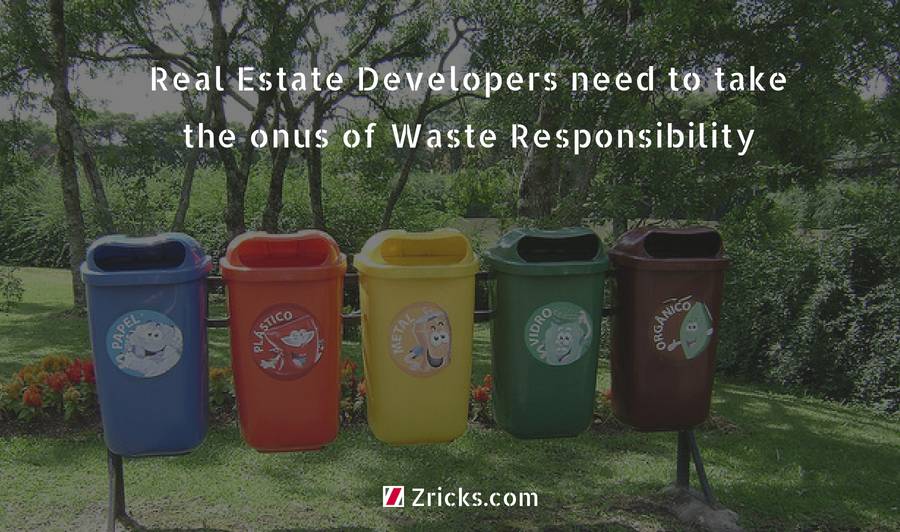Developers need to take the onus of Waste Responsibility
Share Developers need to take the onus of Waste Responsibility
Waste management is a collective responsibility, one which falls under the purview of everyone concerned, and isn’t a responsibility of only a few. This is especially true when we see humongous amount of waste generated on a daily basis in the living spaces that one dwells in. In this context, reports suggest that the real-estate sector is one of the largest contributors to waste generation. It’s responsible for nearly a quarter of the country’s carbon dioxide emissions, which come mainly from energy-intensive processes in making construction materials such as steel, cement and bricks. Real estate development is one of the biggest consumers of natural resources (water, energy, raw materials) and generates gargantuan amounts of wastes and pollutants.
The rapid rate of depletion and concurrent steep rise in greenhouse gases emission and waste generation have resulted in continuous environmental degradation. This is the primary cause of climate change, the rise in average temperatures and deteriorating air quality in our cities. With this alarming consequences staring at our faces, some of India’s top builders have in fact pledged to make at least a fifth of their new housing developments sustainable by 2022, as the country looks to tap sectors other than renewable energy to meet its ambitious climate goals. By adopting green building practices, the real estate sector can reduce its negative ecological footprint and simultaneously help create a more sustainable environment over the long haul. Efforts towards sustainable real estate development involve the optimal use of natural resources, reduction and recycling of wastes, and significantly reduced pollutant emissions. A sustainable environment is the most precious legacy humankind can leave for the future generations.
According to the recent waste management rules, all residents’ welfare and market associations, gated communities and institutions with an area of more than 5,000 sqm. will have to make arrangements to segregate biodegradable waste and compost it within their own premises. Also, more and more builders are ensuring that their projects are IGBC (The Indian Green Building Council) certified, wherein the buildings are ratified on the basis of their water consumption, optimization of energy efficiency, conservation of natural resources, generation of less waste and providing for healthier spaces for occupants, as compared to a conventional building.
Scientific researches in the past decades have confirmed that a major source of unconventional energy can be obtained from waste. Waste-to-Energy, also widely recognized by its acronym ‘WtE’, is the use of modern combustion and biological technologies to recover energy in the form of heat or electricity from urban wastes.
This is where the use of technology could have a major impact in managing waste and achieving environmental sustainability.
Technologies that could help create a sustainable impact:
Conversion of non-recyclable materials through various processes including thermal and non-thermal technologies are being used while recovering energy from waste. Energy that is produced in the form of electricity, heat or fuel using combustion, pyrolization, gasification methods - is clean and renewable energy, with reduced carbon emissions and minimal environmental impact than any other form of energy.
Some of the most commonly used methods include Thermal Conversion, which is a complete oxidation process involving thermal degradation of waste under high temperature; Thermochemical Conversion, which is a common technique for producing both heat and electrical energy from waste is Thermochemical Conversion, which involves direct combustion; Biochemical Conversion, a processes to produce clean energy in the form of biogas which can be converted to power and heat using a gas engine; Physico-chemical Conversion, which involves various processes to improve physical and chemical properties of solid waste, and finally Electrochemical Conversion, which refers to Microbial Fuel Cells (MFC) where the reduction-oxidation equipment of powerless microbial cells is chemically exploited by the addition of the catalyst.
So, the adoption of environment-friendly waste-to-energy technologies is the need of the hour. As different sectors of industries are booming, it is a key responsibility for all to device sustainable waste management system to dispose-off the waste. Also, using the waste to produce energy instead of dumping in landfill, will lower the risks of soil contamination, which is the root cause of endangered wildlife and polluted water sources. It also reduces the reliance on energy imports and the environmental cost of transferring that energy to our country, if we can generate it from our own waste materials.
The real estate industry holds a pivotal role in bringing awareness among the homebuyers and also implementing more eco-friendly solutions in their projects. We have initiated a waste to energy drive, where 3 tonnes waste would be converted to energy, thereby saving nearly 1100 tonnes of carbon dioxide every year. It correlates to about 420 units of electricity generation every day or about 1, 50,000 units every year. However, across India many more developers and builders should actively take up these initiatives, where we ‘Nurture nature, for the future’.
Request a Call Back

